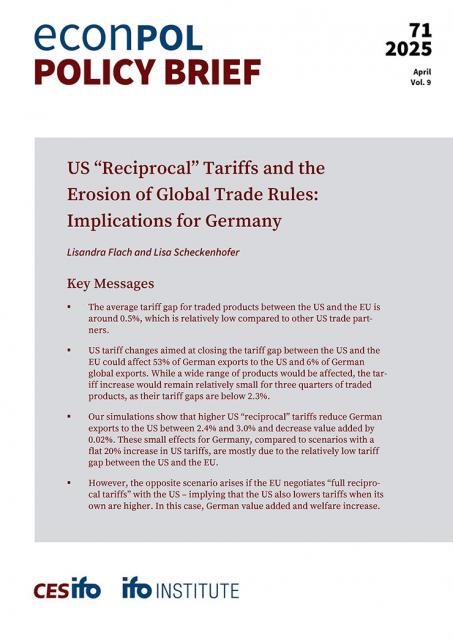News Archive

How Sanctions Work
|
EconPol Forum
| News
The Covid-19 pandemic propelled an enormous uptake in hybrid and fully remote work. Over time, it has become clear that this shift will endure long after the initial forcing event. There are few modern precedents for such an abrupt, large-scale shift in working arrangements. This article analyzes the full text of hundreds of millions of job postings in five English-speaking countries. In doing so, it applies a state-of-the-art Large Language Model (LLM) to analyze the text and determine whether the job allows remote/hybrid work.

The Impact of Economic Sanctions on Target Countries
|
EconPol Forum
| News
Economic sanctions induce considerable economic damage in the target countries. Sanctions by the United Nations cause growth in sanctioned countries to decline by 2 percentage points annually. Extrapolated over ten years, this is equivalent to a 25 percent drop in per capita economic output. Unilateral sanctions by the US lead to an annual decline in growth of almost 1 percentage point in the countries affected. In the long term, this corresponds to a 13 percent slump in the economy’s output per capita.

NATO Countries Slow to Increase Defense Spending
|
Policy Brief
| News
War is raging close to NATO's Eastern border. Russia has attacked Ukraine and threatens those states that in the past had been part of Moscow's sphere of influence. Many of them are now member states of NATO. As a collective defense alliance, this poses a threat to all NATO members. Since the ability to defend against an aggressor does not come for free, defense spending will be on the agenda at the NATO Summit in Vilnius in July 2023.

What Makes a Good Teacher?
|
Policy Brief
| News
What makes a good teacher? This is one of the central questions in the economics of education. General teacher qualifications tend to be poor predictors of teacher quality. Students perform better in science subjects if their teachers hold a subject-specific qualification. The effect is larger for female students, especially when taught by female teachers, and for students from a lower socioeconomic background.

Minimum Income Support Systems as Elements of Crisis Resilience in Europe
|
Policy Report
| News
The new Policy Report analyses the role of social policies in different European welfare states regarding minimum income protection and active inclusion. It finds consistent differences in terms of crisis resilience across countries and welfare state types. In general, Nordic and Continental European welfare states with strong upstream systems and minimum income support (MIS) show better outcomes in core socio-economic outcomes such as poverty and exclusion risks. However, labour market integration shows some dualisms in Continental Europe.
